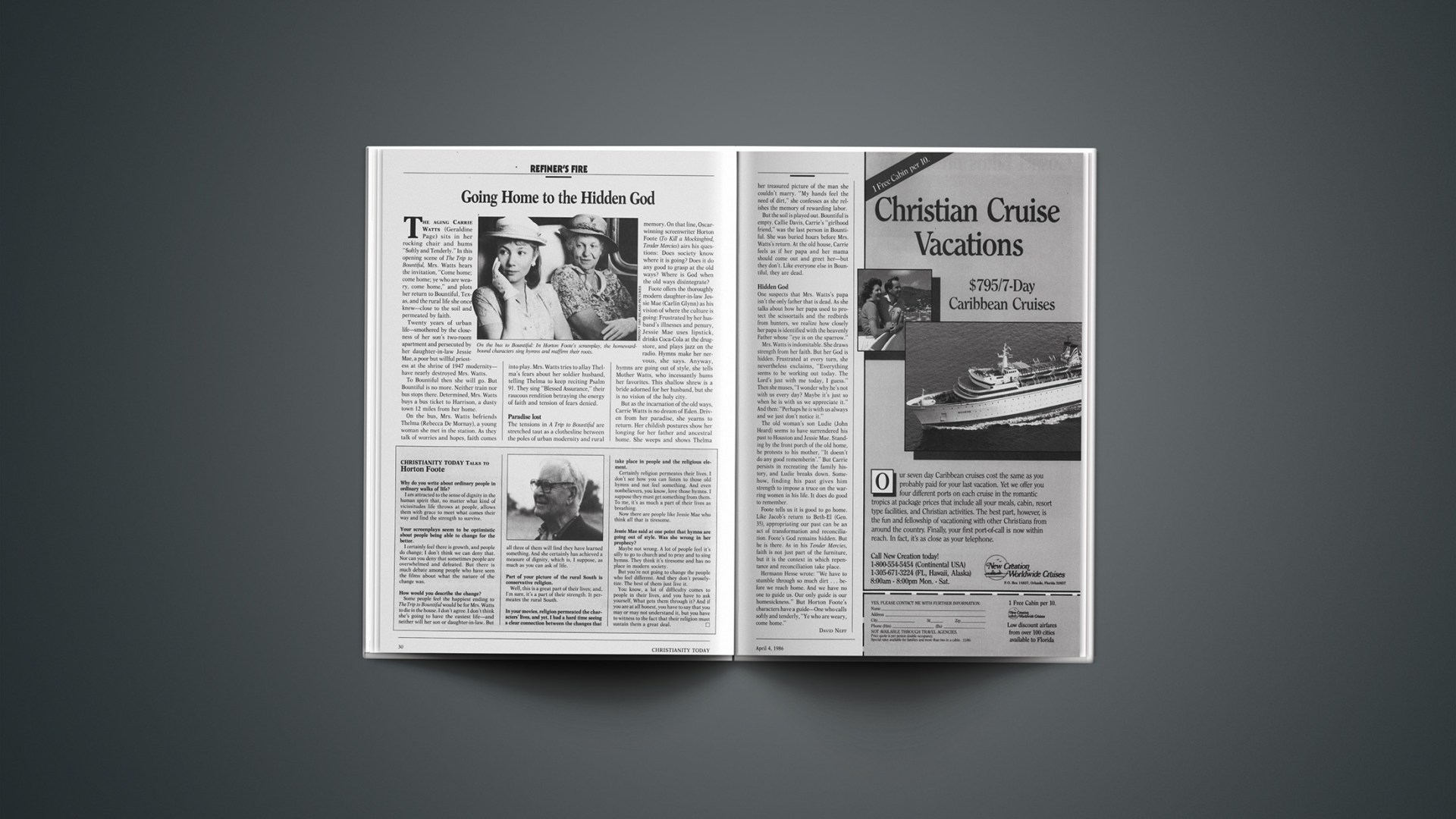The aging Carrie Watts (Geraldine Page) sits in her rocking chair and hums “Softly and Tenderly.” In this opening scene of The Trip to Bountiful, Mrs. Watts hears the invitation, “Come home; come home; ye who are weary, come home,” and plots her return to Bountiful, Texas, and the rural life she once knew—close to the soil and permeated by faith.
Twenty years of urban life—smothered by the closeness of her son’s two-room apartment and persecuted by her daughter-in-law Jessie Mae, a poor but willful priestess at the shrine of 1947 modernity—have nearly destroyed Mrs. Watts.
To Bountiful then she will go. But Bountiful is no more. Neither train nor bus stops there. Determined, Mrs. Watts buys a bus ticket to Harrison, a dusty town 12 miles from her home.
On the bus, Mrs. Watts befriends Thelma (Rebecca De Mornay), a young woman she met in the station. As they talk of worries and hopes, faith comes into play. Mrs. Watts tries to allay Thelma’s fears about her soldier husband, telling Thelma to keep reciting Psalm 91. They sing “Blessed Assurance,” their raucous rendition betraying the energy of faith and tension of fears denied.
Paradise Lost
The tensions in A Trip to Bountiful are stretched taut as a clothesline between the poles of urban modernity and rural memory. On that line, Oscar-winning screenwriter Horton Foote (To Kill a Mockingbird, Tender Mercies) airs his questions: Does society know where it is going? Does it do any good to grasp at the old ways? Where is God when the old ways disintegrate?
Foote offers the thoroughly modern daughter-in-law Jessie Mae (Carlin Glynn) as his vision of where the culture is going: Frustrated by her husband’s illnesses and penury, Jessie Mae uses lipstick, drinks Coca-Cola at the drugstore, and plays jazz on the radio. Hymns make her nervous, she says. Anyway, hymns are going out of style, she tells Mother Watts, who incessantly hums her favorites. This shallow shrew is a bride adorned for her husband, but she is no vision of the holy city.
But as the incarnation of the old ways, Carrie Watts is no dream of Eden. Driven from her paradise, she yearns to return. Her childish postures show her longing for her father and ancestral home. She weeps and shows Thelma her treasured picture of the man she couldn’t marry. “My hands feel the need of dirt,” she confesses as she relishes the memory of rewarding labor.
But the soil is played out. Bountiful is empty. Callie Davis, Carrie’s “girlhood friend,” was the last person in Bountiful. She was buried hours before Mrs. Watts’s return. At the old house, Carrie feels as if her papa and her mama should come out and greet her—but they don’t. Like everyone else in Bountiful, they are dead.Hidden God
One suspects that Mrs. Watts’s papa isn’t the only father that is dead. As she talks about how her papa used to protect the scissortails and the redbirds from hunters, we realize how closely her papa is identified with the heavenly Father whose “eye is on the sparrow.”
Mrs. Watts is indomitable. She draws strength from her faith. But her God is hidden. Frustrated at every turn, she nevertheless exclaims, “Everything seems to be working out today. The Lord’s just with me today, I guess.” Then she muses, “I wonder why he’s not with us every day? Maybe it’s just so when he is with us we appreciate it.” And then: “Perhaps he is with us always and we just don’t notice it.”
The old woman’s son Ludie (John Heard) seems to have surrendered his past to Houston and Jessie Mae. Standing by the front porch of the old home, he protests to his mother, “It doesn’t do any good rememberin’.” But Carrie persists in recreating the family history, and Ludie breaks down. Somehow, finding his past gives him strength to impose a truce on the warring women in his life. It does do good to remember.
Foote tells us it is good to go home. Like Jacob’s return to Beth-El (Gen. 35), appropriating our past can be an act of transformation and reconciliation. Foote’s God remains hidden. But he is there. As in his Tender Mercies, faith is not just part of the furniture, but it is the context in which repentance and reconciliation take place.
Hermann Hesse wrote: “We have to stumble through so much dirt … before we reach home. And we have no one to guide us. Our only guide is our homesickness.” But Horton Foote’s characters have a guide—One who calls softly and tenderly, “Ye who are weary, come home.”
DAVID NEFF
CHRISTIANITY TODAY TALKS TO Horton Foote
Why do you write about ordinary people in ordinary walks of life?
I am attracted to the sense of dignity in the human spirit that, no matter what kind of vicissitudes life throws at people, allows them with grace to meet what comes their way and find the strength to survive.
Your screenplays seem to be optimistic about people being able to change for the better.
I certainly feel there is growth, and people do change; I don’t think we can deny that. Nor can you deny that sometimes people are overwhelmed and defeated. But there is much debate among people who have seen the films about what the nature of the change was.
How would you describe the change?
Some people feel the happiest ending to The Trip to Bountiful would be for Mrs. Watts to die in the house. I don’t agree. I don’t think she’s going to have the easiest life—and neither will her son or daughter-in-law. But all three of them will find they have learned something. And she certainly has achieved a measure of dignity, which is, I suppose, as much as you can ask of life.
Part of your picture of the rural South is conservative religion.
Well, this is a great part of their lives; and, I’m sure, it’s a part of their strength. It permeates the rural South.
In your movies, religion permeated the characters’ lives, and yet, I had a hard time seeing a clear connection between the changes that take place in people and the religious element.
Certainly religion permeates their lives. I don’t see how you can listen to those old hymns and not feel something. And even nonbelievers, you know, love those hymns. I suppose they must get something from them. To me, it’s as much a part of their lives as breathing.
Now there are people like Jessie Mae who think all that is tiresome.
Jessie Mae said at one point that hymns are going out of style. Was she wrong in her prophecy?
Maybe not wrong. A lot of people feel it’s silly to go to church and to pray and to sing hymns. They think it’s tiresome and has no place in modern society.
But you’re not going to change the people who feel different. And they don’t proselytize. The best of them just live it.
You know, a lot of difficulty comes to people in their lives, and you have to ask yourself, What gets them through it? And if you are at all honest, you have to say that you may or may not understand it, but you have to witness to the fact that their religion must sustain them a great deal.










